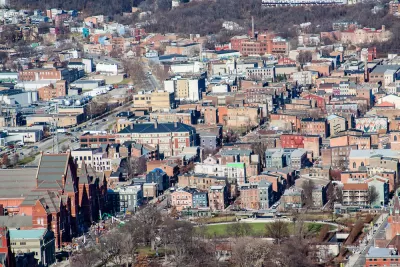For low-income renters, security deposits can be a hurdle they cannot overcome. Cincinnati's “renters’ choice” program aims to help with that challenge by providing alternatives to traditional security deposits.

"In April this year, [Cincinnati] became the first city in the U.S. to require landlords to accept alternatives to a security deposit. Cincinnati’s bold move has been hailed as a way to disrupt a broken system for renters. Other cities and states are now also offering deposit alternatives to make housing more accessible to low-income renters," reports Liza Ramrayka.
The challenge of coming up with the cash for a security deposit is one that many low-income and homeless residents face. During the pandemic, the increase in evictions and job losses in Cincinnati and other cities across the country have made security deposits even more of an issue.
"Cincinnati’s renters’ choice legislation applies to all landlords with 25 units or more and offers three options: an insurance premium, in which the tenant pays a small monthly, nonrefundable fee instead of an upfront deposit; an installment plan to spread the deposit equally over six months (or more if the landlord agrees); or a reduced security deposit, paid upfront, of no more than half the monthly rent," says Ramrayka.
Some landlords argue that dealing with an insurance plan is onerous and costly and that the focus on larger buildings means tenants have fewer options. But supporters say the program will benefit residents most in need of housing assistance. "Cincinnati’s legislation is part of a wider movement to disrupt what is arguably an outdated system, particularly where low-income housing is scarce," adds Ramrayka.
FULL STORY: Cincinnati’s Bold New Law Could Help Renters Survive The Eviction Crisis

Maui's Vacation Rental Debate Turns Ugly
Verbal attacks, misinformation campaigns and fistfights plague a high-stakes debate to convert thousands of vacation rentals into long-term housing.

Planetizen Federal Action Tracker
A weekly monitor of how Trump’s orders and actions are impacting planners and planning in America.

In Urban Planning, AI Prompting Could be the New Design Thinking
Creativity has long been key to great urban design. What if we see AI as our new creative partner?

Massachusetts Budget Helps Close MBTA Budget Gap
The budget signed by Gov. Maura Healey includes $470 million in MBTA funding for the next fiscal year.

Milwaukee Launches Vision Zero Plan
Seven years after the city signed its Complete Streets Policy, the city is doubling down on its efforts to eliminate traffic deaths.

Portland Raises Parking Fees to Pay for Street Maintenance
The city is struggling to bridge a massive budget gap at the Bureau of Transportation, which largely depleted its reserves during the Civd-19 pandemic.
Urban Design for Planners 1: Software Tools
This six-course series explores essential urban design concepts using open source software and equips planners with the tools they need to participate fully in the urban design process.
Planning for Universal Design
Learn the tools for implementing Universal Design in planning regulations.
Gallatin County Department of Planning & Community Development
Heyer Gruel & Associates PA
JM Goldson LLC
City of Camden Redevelopment Agency
City of Astoria
Transportation Research & Education Center (TREC) at Portland State University
Jefferson Parish Government
Camden Redevelopment Agency
City of Claremont





























